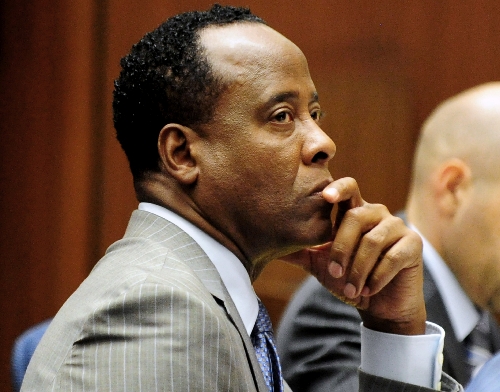Coroner rejects Jackson doctor’s defense
LOS ANGELES -- A medical examiner struck a blow to the defense of Michael Jackson's doctor Tuesday, saying it is unreasonable to believe Jackson could have given himself a fatal dose of the powerful anesthetic propofol.
Dr. Christopher Rogers, who conducted the autopsy on Jackson, testified it was more likely that Dr. Conrad Murray overdosed the singer when he incorrectly estimated how much of the drug he was giving Jackson to induce sleep to fight insomnia.
Rogers, chief of forensic medicine in the Los Angeles County coroner's office, said Murray had no precision dosing device available in the bedroom of Jackson's rented mansion.
Murray has pleaded not guilty to involuntary manslaughter.
Rogers analyzed two possible scenarios for Jackson's death. The first was the defense theory that while Murray stepped away to go to the bathroom, Jackson gave himself an extra dose of the drug he called his "milk."
"In order for Mr. Jackson to have administered the propofol to himself, you would have to assume he woke up and although he was under the influence of ... propofol and other sedatives, he was somehow able to administer propofol to himself," Rogers testified. "Then he stops breathing, and all of this takes place in a two-minute period of time. To me, that scenario seems less reasonable."
"Less reasonable than what?" Deputy District Attorney David Walgren asked.
"The alternate scenario would be in order to keep Mr. Jackson asleep, the doctor would have to give him a little bit every hour, two or three tablespoons an hour," Rogers said, noting that propofol is a short-acting drug that wears off quickly.
"We did not find any precision dosing device, so the doctor would be estimating how much he was giving," the medical examiner said.
Murray told police he gave Jackson 25 milligrams of the drug, a small dose that usually would have kept him asleep for no more than five minutes.
Rogers said he examined evidence in Jackson's bedroom, which included an empty 100-milliliter bottle of propofol.
Rogers said the cause of death was "acute propofol intoxication, and the contributing condition was the benzodiazepine effect."
Two sedatives from that drug group, lorazepam and midazolam, were found in Jackson's system after he died.
Rogers said he considered a number of factors in ruling the death a homicide. Among them were Murray's statements to police and the lack of sophisticated medical equipment in Jackson's bedroom, where the superstar had been receiving the anesthetic.
He said there was no EKG monitor and no resuscitation equipment present in the room.
Rogers also testified it would be inappropriate to use propofol outside a hospital or medical clinic.


















